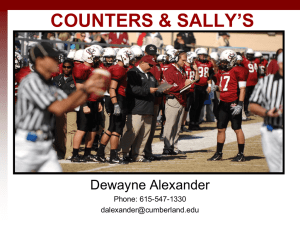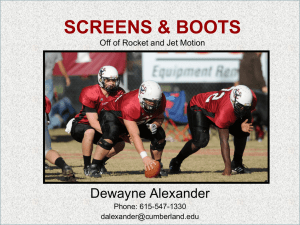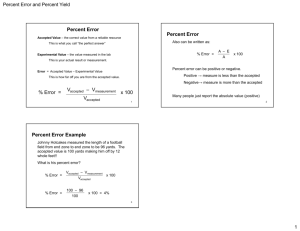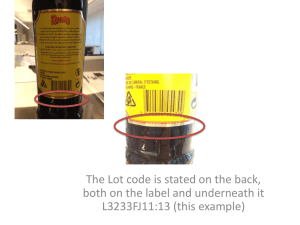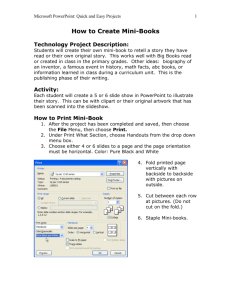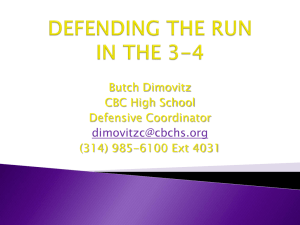Installing a Fast Break Run Game from the Pistol
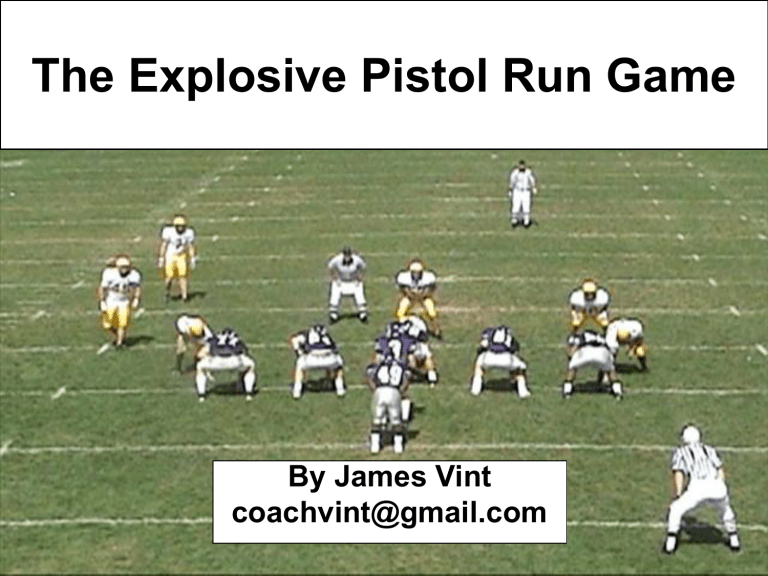
The Explosive Pistol Run Game
By James Vint coachvint@gmail.com
“If You Have A Systematic Way
To Teach An Offense, Your Kids
Will Have A Systematic Way Of
Learning The Offense”
Topics We Will Cover
• Formation Identification
• Motion Rules
• Inside Run Game
• Outside Run Plays
• Misdirection Game
• Play Action Passes
Why The Pistol?
• Allowed us to eliminate some tendencies with our zone read game
• Allowed us to run our base two back offense from the gun
• We could balance up and force defenses to do the same
• We could run our entire option package!
• We could flip plays and protections without flipping our running back
• Created conflict within the defense
Our Base Spread Formation
X Z
H
Q
A
Y
Our offensive line will have 2 to 2.5 foot splits.
X and Z Align 2 yards inside the top of the numbers.
Our H and Y align 5 to 7 yards outside the tackle.
Our QB aligns 3.5 to 4 yards behind the center.
Our A Back aligns 6 to 7 yards off the football.
Our Pistol Set Illustrated
Pistol Base (Wide)
Ace Set
X Y
H Z
Q
A
Our Y aligns as a hand down tight end.
Our H will align splitting the distance between the X and the tackle, and he will be one yard off the LOS.
Our X and Z aligns based on our field/boundary rules
We want our H and Z to press the line of scrimmage. We want them as tight as they can be without getting penalized.
Trips Set
X Z
Y H
Q
A
In Trips, our Y lines up 2 yards outside our tackle, 1 yard off the LOS.
Our H will align splitting the distance between the Z and the
Y, and he will also be one yard off the LOS.
We want our H and our Y to press the line of scrimmage. We want them as tight as they can be without getting penalized.
Trips Z
X
Q
A
Z
Y
We move the X inside to create a coverage mismatch in a man situation.
H
Our Z will line up on the line, 5 yards outside our Y.
Our H will line up 1 yard off the ball, 12 to 15 yards outside the tackle.
Bunch
X
Q
A
Y
H Z
We can widen or tighten our bunch alignment based on the concept called.
Our Y will line up 2 yards outside the tackle on the LOS.
Our H will line up 1 yard off the ball, splitting the distance between the tackle and the Y.
The Z will line up 1 yard outside Y, and 1 yard back.
Trips C (Closed)
Y
Q
A
H X
We can personnel to bring our second TE in the game.
Z
Our Y will line up with a 3 foot split in a 3 pt. stance.
Our H will line up 2 yards outside our tackle to the trips side.
Our X will split the distance between the Z and the H.
The Z will line up 12 to 14 yards off the football.
Ace
X Y
H Z
Q
A
We can widen or tighten our bunch alignment based on the concept called.
Our TE is lined up in a three point stance, 2.5 feet from our tackle.
Our H lines up in his base alignment.
Ace Slot Wing
X
H
Q
A
Y
Z
We sometimes will take our Z out and bring a 2 nd TE into the game.
Z and H line up 1x1 from the EMOL.
We can motion our Z back out, or across the formation to create a coverage mismatch.
Navy
X
H
Q
A
Y
We can personnel the Navy set for different concepts.
Z
Z and H line up 1x1 from the EMOL.
We can motion our Z back out, or across the formation to create a coverage mismatch.
Navy Bunch
X
H
Q
A
Z
Y
Compressed formations are great versus man coverage.
Z and H line up 1x1 from the EMOL.
Our X and Z close down and line up 2 yards outside the Y and H.
Queen
X
H Q
A
Z
Y
In our 2 back look we will bring our F into the game for our H at times.
The Y lines up in his base alignment.
The H lines up on the outside leg of our guard.
Queen alerts the H he will line up away from our Y.
King
X
Z
Y
Q
A
H
The Y lines up in his base alignment.
The H lines up on the outside leg of our guard.
King alerts the H he will line up on the same side as our Y.
King Pro
X
Q
A
Y
Z
H
Pro alerts the TE he will line up on the LOS in our
King and Queen Sets.
The Y lines up in a 3 pt. stance 2.5 feet from our tackle.
The H lines up on the outside leg of our guard.
King alerts the H he will line up on the same side as our Y.
King Pro
Queen Pro
X
Y
Z
H Q
A
Pro alerts the TE he will line up on the LOS in our
King and Queen Sets.
The Y lines up in a 3 pt. stance 2.5 feet from our tackle.
Queen alerts the H he will line up opposite the TE.
Queen C (Twins Closed)
Z Y
X
H Q
A
We will line up with our
TE on line, and twins opposite the TE.
Our #2 receiver is on line 6 yards from the tackle.
Our #1 receiver lines up 12 yards from the tackle and 1 yard off the ball.
King C (Twins Closed)
Y X
H Q
A
King allows us to line up with a twins closed look.
Our FB is offset with the Y.
Our #2 receiver is on line 6 yards from the tackle.
Our #1 receiver lines up 12 yards from the tackle and 1 yard off the ball.
Z
Queen B (Twins Closed)
Z Y
X
H Q
A
We will line up with our
TE on line, and twins opposite the TE.
Our Z lines up 2 yards outside the tackle.
Our X lines up 1x1 on the Z.
Our H lines up straddling the IS leg of the tackle.
King Pro Bunch
X
Y
Z
Q H
A
Bunch alerts the H he will widen to straddle the outside leg of our tackle.
The Y lines up in a 3 pt. stance 2.5 feet from our tackle.
Our Y lines up 1x1 on the TE.
Our H will widen his alignment.
Motion Concepts
• We use motion to gain an advantage at the point of attack
• We want to remove a defender
• We want to gain leverage
• We want to change the strength
• We want to make a coverage determination
Receiver Motion
• Zip- #1 into the formation
• Zap- #1 away from the formation
• Zoom- #1 across the formation
• Rip- Left IS Receiver across the formation
• Liz- Right IS Receiver across the formation
• Motor- Right IS WR motions out past the #1 WR
• Motel- Left IS WR motions out past the #1 WR
• Tom- Y shuffle motion to the play
• Ted- Y Shuffle motion away from the play
• Hop- H Shuffle motion to the play
• Hip- H Shuffle motion away from the play
• Jet- Motion to mesh with the QB as on Jet Sweep
RB Motion
• Hump- A Back to the TE
• Jump- A Back away from the TE
• Away- H (in the backfield) away from the TE
• To- H (In the backfield) to the TE
• Orbit- Motions our H or A back into the backfield
Adding Re to any motion brings the player back
Adding slow to any motion slows the player down
Example of Zip
X Y
H
Q
A
The Z will motion into the formation.
The ball will be snapped when the Z is 2 yards outside the Y.
If we flip the formation, the X would be in motion.
Z
Example of Zip
X
Y
H
Z
Q
A
To the Right, the Z is in motion.
The ball will be snapped when the X is 2 yards outside the Y.
X
Example of Zip from King
Y
Z
Q
A
H
We can motion our Z back to the formation from our
King Look as well.
Example of Motor
X Z
H
Y
Q
A
The Z will tighten his split
The Y will motion outside the Z.
If we called MOTEL, the H would motion outside the X.
The QB snaps the ball when the Y is 4 yards outside the Z.
We are trying to create a match-up advantage.
Example of Zap
X
Y
H
Z
Q
A
To the right, the Z will be in motion.
The ball will be snapped when the X is 2 yards outside the Y.
Example of Rip
X Z
H
Y
Q
A
On Liz, the Y is in motion form our base look.
The ball will be snapped when the H is 2 yards outside the tackle.
Example of Rip From Trips
X Z
H Y
Q
A
From Trips Left, the Y will motion back to his normal alignment.
If we are in trips right and want to motion back to our base 2x2 look, the H would be in Liz motion.
Example of Jump
X Z
H Y
Q
A
The WR to the motion side will close his split down to 8 yards.
Hump tells the A back he will motion away from the Y.
Installing Our Inside Run Game
• Frontside Inside Zone
• Inside Zone Read
• Isolation Play
• Downhill Run Series
• Belly Series
• Trap
• Power
Our Inside Zone and Variations
• 42-43 Inside (Traditional IS Zone)
• 42-43 Inside Lead
• 42-43 Seal (Split Flow Zone)
• 42-43 Bend
• 42-43 Inside Read (Reading Backside
End)
Inside Zone Rules
• Center: Playside A Gap (0)
• PSG: Playside B Gap (1)
• PST: Playside C Gap (2)
• BSG: Backside A Gap (1)
• BST: Backside B Gap (2)
• TE: Frontside D Gap #3
• H: Frontside #3 or #4 or Backside #3
• Our landmark is the playside Jersey number.
Inside Zone Count System
3
E
2
W
1
T
M
1
T
2
E
3
S
Q
A
Uncovered and Covered lineman will work combination
They will track the down lineman to the linebacker
We will make a solid call if everyone is covered
Inside Zone Count System
3
E
2
W
1
T
M
1
T
2
E
3
S
C
LG
LT
RG
RT
TE
Identify Mike as 0, Combo with RG, combo 3 Tech to Mike
Covered, Listen for combo call, DT is 1, combo 1 tech to Will
Identify Will as 2, make combo call, combo 1 tech to Will
Identify 3 Tech as #1, listen for combo call, combo 1 tech to Mike
Covered by #2, make solo call, you have 2 to yourself
Covered by #3, make solo call as you and RT are covered
Inside Zone Numbering Versus Fronts
Zone To The Right
1
W
3 2
0
E T T
1
M
2
E
3
S
1
3 2
W
0
E T T
1
M
2 3
E S
Double Eagle
Eagle Weak
2
W
3
E
Inside Zone Numbering Versus Fronts
Zone To The Right
1
M
0
N
1
S
2
E
3
$
3
E
1
W
2
T
1
M
0
T
2
E
3
S
30 Stack
22 Stack Up
We number our stack by game plan. Whenever we face a stack defense, we go back to our gap rules. We have our gap first.
Covered/Uncovered Zone Concept
M M
T T
This is an example of an
Ace call on 42 IS. The RG is covered with a 3 tech, and the Center is uncovered with a man over.
The RG and Center take their playside zone step with eyes to their gap.
The uncovered player must have his eyes in his PSG.
In the case above, the 3
Tech slanted inside and the
Center has to pick him up.
The RG sees him go away and now works to the player filling the B gap.
If the Mac were to step up to blitz, the Center would make a base call. This would eliminate the Arizona call and put both lineman on a base block.
Handling Stunts
B
L
E
B
T
T
B
E
This is a two-on-two drill working two offensive lineman vs. a defensive lineman and a backer. This is a generic drill where we will put guards with tackles and centers with guards.
We want this to be a game speed drill once the initial teaching is done.
You must work against twists, slants, and loops!
This is our three on three drill we do a lot because of stacked fronts. We get head up tackles that will slant. We work this drill with the frontside, then the backside. We get our eyes up and this teaches the kids to be able to work an inside threat. We teach patience in this drill and we follow a very strict rule, “Don’t Chase Backers.”
Inside Zone Rules QB FW
QB will take the football through the 3 rd hand, open at 45 to the call side, and reach the ball deep.
The QB is responsible for the handoff reaching the navel of the running back.
The handoff must be 2 inches below the sternum.
We tell the QB to step at 45 and roll it back.
The QB will boot fake after giving the football.
Inside Zone Rules TB Footwork
The Tailback will take a zone step to the playside and ensure the QB secures the snap.
The tailback will rollover his outside foot and make a deep soft pocket with his top palm out.
The tailback’s eyes are reading the flow of the first frontside combo
We tell the TB to read A to B to go, but with patience.
The tailback must burst on first daylight.
3
Inside Zone Play
E
2 0
W
1
M
T
1
T
2
E
3
S
Q
A
• The Tailback Takes A Zone Step To The Play Side
Keeping His Shoulders Parallel To The LOS
• He Then Works Downhill At The Inside Hip Of The PST
• He keys the first frontside combo block
• The TB MUST keep his shoulders parallel to the O-Line!
3
E
Inside Zone Play
T
2
1 1
W M
0
T
2
E
3
S
Q
A
• The Tailback Takes A Zone Step To The Play Side Keeping His
Shoulders Parallel To The LOS
• He Then Works Downhill At The Inside Hip Of The PST
• He keys the first frontside combo block
• The TB MUST keep his shoulders parallel to the offensive line.
Inside Zone Play With A Base Call
1
W
1
M
2
E
0
N
2
E
Q
A
• Base is an alert that there is no #3 backside.
• The BST will base the backside DE.
• He must eliminate the slant by the DE.
Inside Zone Lead
• Offense has a lead blocker to the frontside.
• The F or H will block the PSLB or SS.
• We must have a BOSS or BOB call.
• BOSS- Back on Strong Safety (Outside)
• BOB- Back on Backer (Inside)
• BOMB- Back on Stacked Mike (3-3)
Inside Lead Play (BOSS)
3
E T
2
1 1
W M
0
T
2
E
3
S
R
Q
F
A
• The F will make a BOSS call, alerting the offensive that he will block the #4 defender to the playside.
• He must stay tight to the tight end and read the flow of the R
• The TB reads stay the same.
Inside Lead Play (BOB)
3
2
W
0
M
1
T
2
S
E
1
T E
3
Q
F
A
• BOB puts the F on the PSLB
• The PST and PSG will now double the 3 tech
• The TB will run the V
• The TB will read off the Mike.
B
Inside Lead Play (BOB)
2
W
3
E
1
M
0
N
1
S
2 3
E $
Q
F
A
• BOB gives us a triple team on the nose to the
Mike
• The FB will block the stacked Sam
• The PST will block man on the DE.
Inside Lead Play (BOMB)
B
2
W
3
E
1
M
0
N
1
S
2 3
E $
Q
F
A
• BOMB is a call traditionally versus a 3-3
• BOMB puts the FB on the stacked Mike
• The PSG and PST will combo the DE to the
Sam
Split Flow Zone
• One advantage of the pistol is being able to run the split flow zone in a more traditional manner.
• Our H has backside number 3 by rule.
• Because we are sealing the backside, we have opened up a better chance for the cutback.
• We can run the split flow zone from multiple pistol formations.
Split Flow Zone
W M
E T T E S
The split key will slow the pursuit of the linebackers.
The fullback will be responsible for the backside C gap.
If the backside C gap play comes upfield, work to the backside cutback player.
King Pro 42 Bend
W M
E T T E S
Bend alerts the FB he will block the backside ILB
Bend alerts the TB we are basing the backside DE.
The TB will read tighten his path slightly
Inside Zone Misdirection
• We can create false flow keys for the linebackers.
• We can use misdirection with our Zone,
Counter, and Trap game.
• We can run multiple looks with essentially one concept.
Fake Z Reverse
W M
E T T E S
We want the Z to hold the backside DE
The FB will read the flow of the end (Upfield or Squeeze)
The back is looking for our natural cutback lane
We use Zip Motion
42 Inside Seal Fake Z PreSnap
42 IS Seal Fake Z
42 IS Seal (Mesh)
FB Should work upfield as the DE is gaining depth
42 IS Seal (Burst)
E
W
33 Inside
M
T T E S
The QB will open up at a 45 and give the ball to the FB with his left hand.
The QB and tail back will carry out their IS Zone action.
The FB will read the block on the 1 st down defender to the playside.
33 Inside Fake Z
W M
E T T E S
The QB will open up at a 45 and give the ball to the FB with his left hand.
The QB and tail back will carry out their IS Zone action.
The Z must sprint as if he has the football!
The Inside Read Play
• Forces the defense to play assignment football
• The offense can account for the #3 defender to the backside
• Allows the offense to incorporate option principals without installing a new blocking scheme
• The QB gets to be a part of the run game
3
E
Inside Read
2 0
W
1
M
T
1
T
2
E
3
S
Q
A
• The TB will take a jab step opposite the call.
• The QB will push away and step at 45 (Similar to Midline)
• The QB will read the backside #3 player “Squeeze and
Chase, Pull and Replace”
• The back will read Will to Mike
Inside Read Option
3
E
2 0
W
1
M
T
1
T
2
E
3
S
F
Q
A
• The F or A can become our zone back with the opposite back being the pitch back
• The read stays the same for the QB
• If the F is the zone back he will drop step to the
QB and roll it over making a deep soft pocket
42 IS Read Option
3
E
2 0
W
1
M
T
1
T
2
E
3
S
Q
F
A
• The A is our Zone back with the F as our pitch back
• The reads stay exactly the same
• The QB will read the backside #3 player “Squeeze and
Chase, Pull and Replace”
• If the QB gets a pull read he will pitch off the force defender
Installing The Isolation Play
• Allows us to Isolate an Inside or Outside
Backer
• Gives us zone combination blocks at the point of attack
• Easily adjusted for multiple defensive looks
• Gets the ball to a good athlete with an opportunity to get downhill quickly.
Isolation Rules
• We will use slow rotating zone combination blocks
• Aiming point is the near ear, near number of the down defender
• We will “part the seas” at the point of attack
• We will use Jam Step footwork for our zone combination blocks
• We must communicate who we are going to isolate
King Pro 42 Iso vs. a 4-3
E
W
T
M
T
S
E
Q
F
A
• Versus a 4-3 we want to isolate the C gap bubble to the strong side
• We will combo the 3 tech and the 1 tech
• The TB will run off the block of the F
King Pro 42 Iso vs. Under Front
E
W
T T
M
E S
Q
F
A
• Versus an under front we want to isolate the
Mide backer
• We will combo the shade to the backside backer
• We will base the backside
King Pro 42 Iso vs. 3-3
W
E
M
N
S
E $
Q
F
A
• Versus a 3-3 Stack we can isolate the
PSLB or Mike
• We can play a 3 man game with the center and Guards
B
King Pro 42 Iso vs. 3-3
W
E
M
N
S
E
$
Q
F
A
• If the PS $ is off the line we can combo the
DE to the PSLB
• We can then Isolate the Mike
King Pro 42 Bison vs. Over
E
W
N
M
T E S
$
Q
F
A
• Bison is our alert for a backside Isolation Play
• We can take advantage of a fast flow defense
• The Fullback will isolate the backside ILB
42 Inside Combo BOB
3
E
2 0
W
1
M
T
1
T
2
S
3
E
Coaching Point: Zone
Combos Are Designed
To Get Movement, But
You Must Have Four
Eyes On The Backer
• BOB Tells The H He Has The PSLB (Back on Backer)
• We Combo The 3 Tech To The Mike With 4 Eyes To Backer
• The BST Has #2 By Rule, and We Can Adjust Him To Stay On
3 and Change The Double On The Shade To A Zone Combo
To The Will
The Downhill Concept
• Attack the A and B Gaps of the Defense
• Get the ball downhill quickly
• Allows us to be physical up front
• Takes advantage of read and react defensive line
• Can be run versus any front
Downhill Concept Illustrated
E
W M
T T E
Q
We can have the QB fake frontside or backside.
A
• Tailback takes a hard downhill step with his playside foot.
• He works downhill to the Void
• TB must be prepared to win a 1 on 1 battle with the LB
• OL can incorporate fold schemes to eliminate leverage!
Downhill Concept Illustrated
E
W M
T T E
Q
We can fake veer action from the QB.
A
• Tailback takes a hard downhill step with his playside foot.
• He works downhill to the B gap Bubble
• The center and PST can cut the 1 tech and DE.
43 Fold
E
W M
T T E
Q
We can fake veer action from the QB.
A
• Our fold scheme gives us angle blocking at the
POA.
• The PSG will block down on the 1 tech
• The Center will wrap around the PSG to the
PSLB.
43 Kick
E
W M
T T E
Q
We can reverse pivot as well.
A
• Kick alerts the Center will be kicking out the
EMOL.
• The PST will now block the playside ILB.
• The PSG will block down on the shade.
The Belly Series
• Attacks the A, B, and C gaps of the defense
• Multiple Blocking Schemes to create advantages at the POA
• Can be run from nearly every formation
• Excellent Option opportunities
• Play Action and Misdirection can create big play potential
• Forces the defense to play angles
Belly Series Blocking Rules
• The PSG will kick out the EMOL unless tagged
• The PST will block down on the DT (3, 2, 2i)
• We will zone the backside by rule unless tagged
• The Tight End walls the PSLB
• The BST must protect a B gap run through first, then hinge to the C gap
E
S
T
45 Belly “G”
M W
T E
Q
Belly has our playside guard pulling and kicking out the DE.
A
• We will zone the backside with the BST checking for a B gap run through.
• The TE will block the Sam versus a base 4-3.
• The PSG must aim for the inside jersey/leg of the EMOL.
C
Z
R
H
E
45 Belly “G”
S M
W
T T
Y
E
Q
C
We put a wing on the
PSLB as well.
X
A
• The A will widen his path slightly with the wing blocking the Sam.
• Then center and BSG can block the shade tracking the Will.
• The QB must sell run action.
King Pro 45 Belly “G” Iso
S M W
E T T E
We can Isolate the PSLB
Q
F
A
• The FB will use an Isolation block on the PSLB
• The QB and A will utilize belly footwork
• The A will read the block on the PSLB
Queen Pro 35 Belly “G” Iso
S M W
E T T E
Q
We can run Belly with either back to either side.
F
A
• The A back will now have the Iso block.
• The FB will be the ball carrier.
• The offensive line rules remain the same.
S
Y
E
45 Belly Weak
M
T
W
T E
Q
The Qb will use belly footwork.
A
• The PST must get movement on the 3 technique.
• The Center must cut off the PSLB.
• The guard must find the inside number of the
DE.
43 Belly Dive to a Shade-5
E
W M
T T E
Q
Belly Dive is base blocked, with the QB and A back using belly footwork
A
• Tailback and QB utilize belly footwork
• The A back will read the block on the Will
• The center can cut the 1 technique
42 Belly Dive to a 3 Tech
E
W M
T T E
Q
A
• The A back must sell belly off the guard’s butt before working back into the A gap void
• QB must sell run action
43 Belly Fold vs Shade-5
E
W M
T T E
Q
We can fake veer action from the QB.
A
• Belly fold tells the offensive line they will block our fold scheme.
• The QB and A back will utilize belly footwork
• The Center will wrap around the PSG to the
PSLB.
E
45 Belly “G” Fold
S M W
T T E
Q
A
• Fold alerts the PSG he will block the PSLB
• The TE will base reach in our G fold strong
• The back must read the C gap
3
E
42 Belly Inside
2 0
W
1
M
T
1
T
2
E
3
S
Q
A
• The offensive line will use inside zone blocking.
• The ball carrier and QB will utilize belly footwork.
• The A back keys the first combo block
• We want the A back to get downhill and burst
44 Belly “G” to a Solid Front
C R
3
E
2 0
W
1
M
T
1
T
2
E
3
S
X
C
Z H
Q
A
• The PST and PSG will block down.
• The guard will kick out the Sam LB.
• The A back gets on the hip of the PSG and rides the rails.
• The A back must hold the Mike with two downhill steps
Installing The Trap Play
• Isolates a defensive lineman
• Gives the offense great angles to create movement
• Takes advantage of fast flow defenses
• Gets the ball downhill quickly
• Trap and variations can be run from nearly every formation
Trap Rules
• Trap the first defensive lineman outside our playside guard
• If DL being trapped is a 3 tech, make a short call… If he is a 5 tech, make a long call
• The backside guard will be the trapper
• The center will block back
• The PSG will block the PSLB on a short call, and the
Shade or nose on a long call.
• The PST will block the PSLB on a long call, and the first
2 nd level threat on a short call using a sift technique
• The PSTE will release upfield and block the safety
42 Trap versus a solid front
C R
E
W M
T T E S
C
X
H Z
Q
We can use trap, belly, or veer action to hold the linebackers
A
• The PSG will make a short call
• The QB and A back will sell 43 dive.
• As the A back disengages the mesh he will plant his outside foot and get in the trapper’s hip pocket
42 Trap versus an under
C R
E T
W
T
M
E S
X
H
Q
We can use trap, belly, or veer action to hold the linebackers
Z
A
• The PSG will block down
• The center will block back
• The A back must get in the trapper’s hip pocket
C
42 Trap versus a 50 Eagle Wk
C R
E T
W
N
M
E S
C
X
Z H
Q
Versus a 50 the center will base the nose
A
• The PSG will chip the nose to the BSLB
• The BST must scoop the backside DT
• The PST will block the PSLB
32 Trap versus a solid front
C R
E
W M
T T E S
C
X
F
Z
Q
The FB can run the trap as well off zone read action
A
• The PSG will make a short call
• The QB and F back will use their backside mesh footwork.
• The A back will run a pitch path to hold the BSLB
C R
3
E
42 Belly Trap
2 0
W
1
M
T
1
T
2
E
3
S
X
H Z
Q
A
• The belly action will hold the BSLB… The BST will block the B gap
• The QB and A back will utilize belly footwork
• The offensive line will follow trap rules
C
Installing The Power Play
• Isolates a defensive lineman
• Gives the offense great angles to create movement
• Takes advantage of fast flow defenses
• Gets the ball downhill quickly
• Trap and variations can be run from nearly every formation
2 Back Power Rules
• TE and PST will combo a 5 or 7 technique to the first flowing backer
• The guard will zone a 3 tech. If no 3 tech then zone combo with center to BSLB
• BSG will pull and block first daylight- A Gap to B Gap
• BST must scoop out backside B gap unless accounted for, then base backside C gap
• Fullback will kick out the EMOL or first player outside our
TE
• If first player outside our TE is off the line then the
Fullback will execute a centerline block
X
46 Power vs a Solid Front
C R
E
W M
T T E S
Y
C
Z
Q
F
A
• The TE and tackle will work a zone combination block tracking the flow of the first LB to show from the backside
• The FB will kick out the EMOL, aiming for his inside leg
• BSG will pull and block the A gap
X
46 Power vs an Under Front
C R
E
W
T T
M
E S
Y
C
Z
Q
F
A
• The TE and tackle will work a zone combination block tracking the flow of the first LB to show from the backside
• The FB will kick out the EMOL, aiming for his inside leg
• BSG will pull and block the A gap
X
46 Power vs an Under Front
C R
E T
W
T
M
E S
Y
C
Z
Q
F
A
• The center can also block back if the backside is chasing us down
• The BSG must check BS A gap to FS B gap
• The PSG must get a great downblock with movement
C
X
B
46 Power vs an 3-3
W
E
M
N
S
E $
Y
C
Z
Q
F
A
• The TE and tackle will combo the DE to the
PSLB
• The Center and PSG will combo the nose to the
BSLB
• The BSG will pull and block the Mike
1 Back Power Rules
• TE will base the 9 technique
• PST will block the C gap- Vs a 3 tech and 9 tech he will block block the Sam backer
• PSG will base a 3 tech and combo to backside backer with center on any shade or 2i
• BSG will pull and lead up on PSLB
• The back will read first daylight- Check flow of
PSLB
C
X
46 Power- 1 Back versus an Under Front
R
E T
W
T
M
E
Y
S
C
F Z
Q
A
With one back power there is no frontside kick out block
The FST and TE are responsible for blocking the C and D gaps
The backside guard will pull and block the playside linebacker
The backside tackle must scoop the B gap
C
X
46 Power- 1 Back versus a Solid Front
R
E
W
T
M
T E S
Y
C
F Z
Q
A
The PSG, PST, and TE will all block base
The BSG will pull and block the PSLB
The back will tighten his path slightly and look to hit the A gap
Installing The Counter Play
• Takes advantage of the over pursuing defense
• Creates excellent angles for your offensive lineman
• Looks identical to zone for three steps
• Creates a crease for a great athlete
• Easy blocking rules adaptable to any front
Counter Rules
• TE will block frontside C gap
• PST will block frontside B gap
• PSG will block frontside A gap
• Center will block backside A gap
• BSG will pull and kick out EMOL
• BST will pull and lead through on playside backer
-Essentially we “Zone Away” on counter
C
X
46 Counter vs a Solid Front
E
W M
T T E
Y
S
R
C
Z
F
Q
A
• The TE will zone away from the playside and block the DE
• The PST will zone away and block the DT
• The PSG will Zone away and block the Mike
• The Center will block back on the backside DT
• The BSG will pull and kick out the EMOL
• The BST will pull and lead through
Jet Sweep Series
• Jet Concept
• Jet Trap Concept
• Jet Speed Concept
• Jet Zone Concept
Navy 38 Jet Sweep (Crack Scheme)
C
R
E
W
T
F
M
T E
$
C
There are several variations to the jet that we can run.
From our base look, we crack with our wideout and put our pulling guard and our A back on the first threat from the inside out.
C
Navy 12 Jet Trap (Influence)
R
E
F
W
T
M
T E
$
C
The QB will ride the jet back, pull the football and work through the frontside A Gap.
We will influence on the front side. If the tackle widens, our BSG will turn up and look to block first threat.
C
Navy 43 Jet Inside (Crack Scheme)
R
E
F
W
T
M
T E
$
C
The QB will ride the jet and give to the A back.
The frontside blocks jet and the backside blocks inside zone.
C
Navy Jet 19 Speed
R
E
W
T
M
T E
F
$
C
The QB will ride the jet and run a speed path out the back door.
We will block speed on the frontside.
Incorporating the PAP off the Zone
• 42-43 Boot
• 42-43 Naked
• 42-43 Chip
• 42-43 XZ Go
• 42-43 Y Stick
King 142 Chip
E
W
T
M
T E S
QB Reads X, TE, H
King 142 XZ Go
E
W
T
M
T E S
QB Reads Go to
Choice
Queen 142 Lead Naked
S
E T
M
T
W
E
QB Reads X, Y, Z
The Complete Pistol Run Game
By James Vint coachvint@gmail.com
